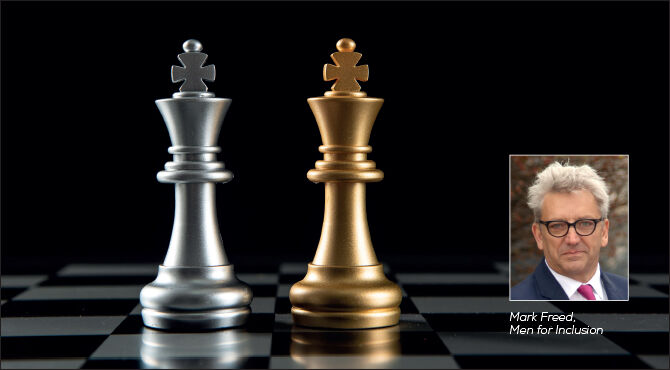How to achieve true equality in the workplace
Organisations that foster diversity are more likely to outperform their competitors, have greater social impact and a more satisfied workforce. To deliver this, the level of female representation matters. Marianne Curphey caught up with Mark Freed, managing director of Men for Inclusion, to find out why.

This article appears in the Winter 2024 issue and the Leadership Supplement from Relocate Think Global People
 Findings from McKinsey & Company’s recent report, ‘Diversity Matters Even More’, found that companies with women’s representation exceeding 30% are significantly more likely to outperform their peers financially. Those in the top quartile for ethnic diversity also show an average 27% financial advantage over others.Yet progress towards true diversity and inclusion has been slow and, in some cases, has reversed. What is holding leaders and organisations back from embracing policies that could make a significant financial and strategic difference?At a time when companies are under pressure to maintain financial performance while navigating a rapidly changing business landscape, it seems an entrenched culture of bias is still limiting the effectiveness of inclusive policies. This is despite the evidence to show there is a strong positive relationship between inclusivity and business success.
Findings from McKinsey & Company’s recent report, ‘Diversity Matters Even More’, found that companies with women’s representation exceeding 30% are significantly more likely to outperform their peers financially. Those in the top quartile for ethnic diversity also show an average 27% financial advantage over others.Yet progress towards true diversity and inclusion has been slow and, in some cases, has reversed. What is holding leaders and organisations back from embracing policies that could make a significant financial and strategic difference?At a time when companies are under pressure to maintain financial performance while navigating a rapidly changing business landscape, it seems an entrenched culture of bias is still limiting the effectiveness of inclusive policies. This is despite the evidence to show there is a strong positive relationship between inclusivity and business success.Transforming workplaces into truly diverse environments

Read related articles
- How to tackle resistance to cultural change in the workplace
- How to create a diverse and inclusive workplace
- Join Us for Think Women 2025: Taking Action on International Women’s Day
- Supercharged You: Leaning into Difficult Conversations
- Think Women: taking action
- Rethinking DEI? Women, equity and work
- The case for male allyship
Men's role and the perception of privilege
One phrase often used in discussions around workplace equality is the perceived ‘privilege’ men enjoy. Mark prefers to use the term ‘relative advantage’ to describe his position, highlighting that men have previously been excluded from the conversation around equality and that not all men have equal advantages.“Privilege is a very emotive word,” he says. “I tend to use words like relative advantage, because when people call me privileged, the first thing that I start to think about is all those reasons why I'm not privileged. I come from a working-class background, I am dyslexic and I failed miserably academically and left education as soon as I could with no qualifications because I can't spell and I can't write. Whereas if somebody says I have relative advantage, I recognise I am a six-foot-four, big-framed, grey-haired man and people tend to listen to me.”He feels that men have been excluded from the conversation around DEI and this has created a sense of loss and exclusion where men are defensive and less likely to support or engage with these initiatives.He also takes issue with the term ‘male ally’ because he believes true equality will only come from systemic culture change rather than a few men becoming workplace advocates for women. For example, men who are allies might see their role as helping women to speak up in meetings and to be heard and not interrupted, rather than changing how the meeting is run so that everyone is heard.“The answer to women being excluded from senior-level social networks is not to teach them to play golf, but to get senior management to think about a more equitable way of making informal connections,” he says. “By implementing true culture change we also get over the barrier of men in middle management asking: ‘What's in it for me?’ when requested to implement DE&I policies.”Diversity across sectors and the green transition
Mark argues that it is important to consider performance from a broader, more inclusive perspective to enable true DEI and unlock significant benefits. He says senior leadership teams often fail to see the business benefits of DEI, leading to ineffective strategies that focus on recruitment and retention without integrating diversity into the culture.Organisations need to change outdated practices and align work cultures with modern values to attract diverse talent, he says. Yet unless true culture change happens, there will still be conflict and resistance from men who feel disadvantaged.The need to recruit more women is particularly pressing for some sectors, such as energy, (including oil and gas), which needs to diversify its workforce and recruit many more employees to support the green transition. Mark says this is an example of an industry still lagging behind on even basic integration policies, like designing onsite and safety equipment for women that fits and is comfortable and providing appropriate changing facilities.“We are working with three clients now who are actively involved in supporting the green transition because that sector is going to have to employ about another half a million people over the next five to ten years,” he says. “Clearly, they can't all be straight white men. The sector understands it needs to start attracting and retaining more women, both in office and site-type environments.”He cites the example of one female employee who explained to him that on her visits to survey and service offshore wind farms she has not access to safety equipment that fits her because all the safety equipment was designed for men and that there are no adequate toilet facilities.“These are just basic things that the industry needs to get right,” he says. “At the same time, all organisations need to change outdated, old-fashioned ways of working, old cultures and unhelpful behaviours to create values that we can all share and get behind.”Mark also highlights the issue of women being overlooked for international assignments –crucial for career progression – arguing that a disproportionate number of men receive invitations to take on international assignments and that often “accidental sexism” is responsible for this.“There are still assumptions about women's suitability for assignments, which can be incorrect, leading to missed opportunities,” he says. “Informal social networks also play a part in career opportunities, with women often being side-lined and overlooked for high-profile roles.”The role of men in DEI and personal career transformation
Mark’s personal journey is one of recognising and challenging gender stereotypes. It is inspired by his wife and the desire to be a better father and husband.“I changed my working life 25 years ago to try to be the type of father and husband I wanted to be,” he says. “At that time, the options for me in a corporate career were to travel all over the world, be away at weekends and see very little of my children.”He credits this decision to review his work-life balance as having been transformational for him. “Having the courage to recognise the stereotypes that are holding you back as a man, and that these are often outdated, old-fashioned male stereotypes, were for me personally and for a lot of men that I talked to a genuine turning point in their lives,” he says.He says it is important to recognise how these outdated stereotypes, which senior leaders often perpetuate, are holding back men and women. When men become part of the conversation, real progress can be made. A starting point is to acknowledge that men and women have different lived experiences, he says.“For example, we need to change the way we run meetings to ensure that everyone is heard, that an idea is given credibility when a woman proposes it, and not just a man,” he says. “Let's build the capability to do that. It is about awareness, desire, understanding and capability.”What is really important then is to make sure those principles and structures are embedded within the organisation. “We all know that when we have been on a training course we come out really motivated and with the appetite for change. Then we get back to our desk, and a day later, that training is finished and forgotten. The key is to ensure that the culture enables conversation and that lasting change can take place.”How to take action and create more inclusive workplaces
- Engage men in the conversation and get them involved
- Recognise that dismantling stereotypes benefits all employees
- Encourage senior leaders to become knowledgeable, credible and authentic role models of inclusive behaviours
- Examine HR policies to find out whether a more inclusive culture is being embedded in your organisation
- Use data more effectively to track how culture change is progressing.
Mark will be the keynote speaker at Think Global Women’s celebration of International Women’s Day on Friday 7 March 2025 at the illustrious Pall Mall venue of the Institute of Directors (IoD) in London. This will be a lively event bringing together top thought-leaders and experts for a full day of discussion, learning, networking and growth.Register now to engage with Mark’s presentation on how we can press for action, encourage men to become part of the conversation around inclusion and embed lasting change in organisations. Hear a lively panel debate on how we move DEI forward and bring your expertise, ideas and lived experience to our feedback sessions. Enjoy a delicious three-course meal in the IoD’s beautiful surroundings, catch up with colleagues and make new contacts.“The really effective message around inclusion is that it enables us to really know and understand the people we work with and the people around us as individuals with their own strengths, weaknesses and cultural nuances,” he says. “That then creates an environment where we can all come together as people and operate with some agreed behaviours and language that we all commit to and abide by.”


Find out more about the Think Global People and Think Women community and events.


Subscribe to Relocate Extra, our monthly newsletter, to get all the latest international assignments and global mobility news.Relocate’s new Global Mobility Toolkit provides free information, practical advice and support for HR, global mobility managers and global teams operating overseas.
©2025 Re:locate magazine, published by Profile Locations, Spray Hill, Hastings Road, Lamberhurst, Kent TN3 8JB. All rights reserved. This publication (or any part thereof) may not be reproduced in any form without the prior written permission of Profile Locations. Profile Locations accepts no liability for the accuracy of the contents or any opinions expressed herein.








































